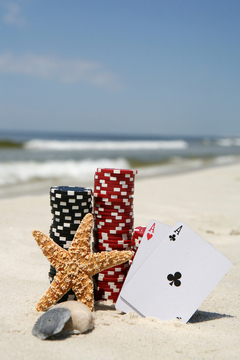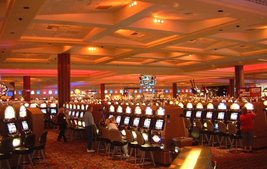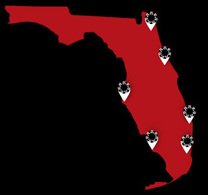






A Look at Poker in the State of FloridaThe Game's Popularity Continues to Climb Despite Legislative Hurdles |
|
|
 Every year, it seems like the state of Florida is debating its poker laws with a variety of competing interests at play — most notably, the powerful Native American tribes and a state legislature desperate to boost revenue. The laws governing poker have been discussed, changed, tweaked, and adjusted so much in the past two decades that it has become difficult to determine just what situation Floridian poker players are in.
Every year, it seems like the state of Florida is debating its poker laws with a variety of competing interests at play — most notably, the powerful Native American tribes and a state legislature desperate to boost revenue. The laws governing poker have been discussed, changed, tweaked, and adjusted so much in the past two decades that it has become difficult to determine just what situation Floridian poker players are in.
In this special feature, Card Player will break down the current poker laws of the state, explain why they exist and show just how far the state has come with the game of poker, while highlighting the current frustrations of the many players in the state.
Florida may not have Las Vegas’ lights or Atlantic City’s history, but with more than 30 poker rooms, it has quickly become one of the largest poker scenes in the United States.
Laying Down The Law
This may surprise people who haven’t made the trip to Florida, but under the current law, cash game buy-ins are restricted to $100. Even more surprising, that hasn’t stopped casinos from spreading $1-$2, $2-$5, and even $5-$10 no-limit hold’em. While most poker pros would be more than a little disheartened by the thought of sitting down to just 10 big blinds, the current laws have come a long way from where they first started.
 In 1989, Florida officially legalized “penny-ante” poker and stopped policing various home games and community centers, as long as the pot never exceeded $10. As poker players might imagine, there was still quite a demand for higher limits.
In 1989, Florida officially legalized “penny-ante” poker and stopped policing various home games and community centers, as long as the pot never exceeded $10. As poker players might imagine, there was still quite a demand for higher limits.
To increase traffic at the state-licensed pari-mutuel facilities, the legislature passed a law in 1996 allowing Jai Alai frontons*, kennel clubs, and horse tracks to spread poker during races. The only problem was that they still had to abide by the $10 rule. At that time, players at a five-handed seven-card stud table would simply put in $2 each and all betting and raising would cease. The dealer simply dealt the rest of the hand face up.
For seven years, both players and cardrooms pressed the state to raise the betting limits, but all attempts failed. In 2003, after both sides had somewhat relented to various stipulations and conditions, Gov. Jeb Bush decided to pass the bill, and poker was allowed to grow, albeit with some new restrictions. The new law stated that the pot could now surpass $10, but players could not bet more than $2 with any given action. This meant no-limit games were still nothing more than a fantasy, but at least the casinos could now spread rousing games of $1-$2 or $2-$2 limit stud, hold’em, or Omaha.
Despite the obvious drawbacks of a game many compared to playing bingo, poker exploded in popularity. Chris Moneymaker had just won the WSOP main event and cardrooms across the state were flooded with new players. Not only were existing rooms expanded to include more tables, but poker rooms began to sprout up and down the interstate, giving everyone from Miami to Pensacola the opportunity to play the game.
 In 2007, the state finally buckled to increasing player demand and allowed the game to expand into its current state. No-limit hold’em was introduced to the casinos, and the players celebrated with their maximum of 50 big blinds for $1-$2. While the cardrooms saw the change as a victory, many players felt that the $100 buy-in rule still reinforced the notion that poker was a game of chance, not skill.
In 2007, the state finally buckled to increasing player demand and allowed the game to expand into its current state. No-limit hold’em was introduced to the casinos, and the players celebrated with their maximum of 50 big blinds for $1-$2. While the cardrooms saw the change as a victory, many players felt that the $100 buy-in rule still reinforced the notion that poker was a game of chance, not skill.
Miami native and Team PokerStars pro Vanessa Rousso (pictured right) was even quoted as saying that Florida players “don’t have enough chips in front of them to play out the bets and raises that are required in the skillful aspect of the game.”
*Jai Alai is a Spanish game popularized in the 1970s and was once considered “the fastest sport in the world.” The fronton is the open-walled arena where the sport is played.
Spreading The Game Thin
Cardrooms in Florida are primarily placed in three different categories, which consist of casinos, pari-mutuel facilities, and ocean gaming. Each is different and governed by unique laws.
Casinos
 Florida casinos are dominated by the Native American tribes — specifically, the Seminoles. In total, the tribe has built seven casinos in cities such as Okeechobee, Clewiston, Coconut Creek, Hollywood, and Immokalee. Their two biggest properties were acquired in late 2006, when the tribe spent $965 million on the Hard Rock Cafe, including hotels and two casinos located in Hollywood and Tampa.
Florida casinos are dominated by the Native American tribes — specifically, the Seminoles. In total, the tribe has built seven casinos in cities such as Okeechobee, Clewiston, Coconut Creek, Hollywood, and Immokalee. Their two biggest properties were acquired in late 2006, when the tribe spent $965 million on the Hard Rock Cafe, including hotels and two casinos located in Hollywood and Tampa.
Both properties are the closest that Florida has to Las Vegas-style gaming, offering huge poker rooms, slot machines, and, since 2008, blackjack and other table games. In total, the seven casinos account for nearly 200 of the poker tables in the state.
The biggest draw to these casinos are the linked bad-beat jackpots, which require that that quad tens be beaten. In some locations, these jackpots have been known to get as high as $250,000 on a routine basis.
Pari-Mutuel Facilities

In fact, the biggest cardroom in the state doesn’t belong to the Seminoles, it belongs to the Palm Beach Kennel Club, (pictured above right) which houses an astounding 59 tables. Poker Director Noah Carbone has been able to bring in the masses without the help of other gaming options such as slots, bingo, or blackjack to offer his players.
“It’s not so much the glitz and glamour, hotels, restaurants, and other casino games that the players really care about,” Carbone explained. “Sure, that helps a little bit, but if you have great dealers and staff, great tournaments, and put out a great product, the players will come. A little hospitality goes a long way in getting return customers.”

“We have a lot of competition in the area, but I’m proud to say that we are more than holding our own,” Lettiere said. “Poker is big here. Players in Florida love their poker, and we love offering it to them in any way, shape, or form we can.”
Ocean Gaming
Any ship or boat with a gaming license can simply sail out three miles from shore and instantly offer Las Vegas-style gambling, including poker, to its passengers. With the current buy-in restrictions in place, you’d think that players would be flocking to these gaming ships for some deep-stacked poker, but factors such as high ticket costs and limited space make it tough for even the popular boats to drum up much action.
 While some ships, like the Palm Beach Princess, have up to seven poker tables on board, others, such as the Big M Casino, have dropped poker entirely. Most passengers willing to put up the $35-$45 entry cost would rather play craps or roulette, two games you can’t find anywhere on land.
While some ships, like the Palm Beach Princess, have up to seven poker tables on board, others, such as the Big M Casino, have dropped poker entirely. Most passengers willing to put up the $35-$45 entry cost would rather play craps or roulette, two games you can’t find anywhere on land.
Now, with blackjack and other table games readily available at the Seminole casinos on shore, ocean gaming as an industry has taken a major hit. SunCruz casinos, (pictured above right), which had ships in port in three different cities in Florida, was recently forced to file for Chapter 7 bankruptcy protection.
What About Tournaments?
Though the inland cash game buy-ins are capped at $100 across the board, tournaments are a different story in the state of Florida. At the Seminole casinos, you can find tournaments and sit-and-gos with buy-ins as high as $1,100. At the pari-mutuel facilities, they can legally top out at $850, though you’d be hard-pressed to find a regular event at that buy-in.
Most rooms run daily tournaments for less than $100, and it’s not uncommon to see most, if not all of the cash games in the room break during that time. Some rooms even offer promotions, such as additional starting chips for those players who take part in the side-games before the tournaments begin.
 The capped buy-in restrictions, of course, mean the state is a long way from hosting the next WPT or WSOP Circuit event, but poker-room directors have gotten more than a little creative to bring big tournaments to their players. Take, for instance, the ongoing Florida Million tournament. This unique $500+$50 tournament takes place at six different cardrooms (mapped left), including the Palm Beach Kennel Club, St. Johns Greyhound Park, Naples/Fort Myers Greyhound Track, Daytona Beach Kennel Club, The Big Easy Poker Room, and Derby Lane Poker Room.
The capped buy-in restrictions, of course, mean the state is a long way from hosting the next WPT or WSOP Circuit event, but poker-room directors have gotten more than a little creative to bring big tournaments to their players. Take, for instance, the ongoing Florida Million tournament. This unique $500+$50 tournament takes place at six different cardrooms (mapped left), including the Palm Beach Kennel Club, St. Johns Greyhound Park, Naples/Fort Myers Greyhound Track, Daytona Beach Kennel Club, The Big Easy Poker Room, and Derby Lane Poker Room.
Players from all over the state competed at one of these locations and battled down until only 10 percent of the original starting field remained. Those advancing players will now combine to play down to a champion on April 10 at the Derby Lane Poker Room in St. Petersburg. The event attracted 2,349 players through day-one play and has already eclipsed its $500,000 guarantee with a total prize pool of $1,174,500.
What Comes Next?
Though there are still significant challenges to overcome in the form of legislation, many see just how far the state has come in such as short period of time and are hopeful that the game continues to come out of the dark ages and become a bigger part of the modern poker world.
The state is currently in talks with the Seminole tribe in an effort to not only raise buy-ins and limits, but perhaps allow pari-mutuel facilities to compete on a larger gaming scale by bringing in slot machines and even electronic machines based on video bingo technology that feature historic horse races. The Seminoles are leery about the changes, and progress is slow, but poker-room directors across the state are decidedly upbeat and optimistic about the game’s potential for growth in the next few years. Many feel that budget shortfalls in the state more than demonstrate the demand and they are just waiting for the two sides to come to an agreement on the terms.
Even online poker is being discussed. In early March, State Rep. Joseph Abruzzo filed a bill to legalize online poker within the state. The Internet Poker Consumer Protection and Revenue Generations Act of 2010 would allow the state to authorize, implement, and create a licensing and regulatory structure for online poker and bring in an estimated $200 million per year. The bill would also designate the Division of Pari-Mutuel Wagering as supervisor of the proposed intrastate poker.
Regardless of what lawmakers decide to do, it is clear that poker is here to stay in the state of Florida. With a loyal customer base and more card rooms than ever before, Florida is putting itself right on the poker map with states such as New Jersey, Connecticut, Mississippi, and perhaps even California and Nevada.
